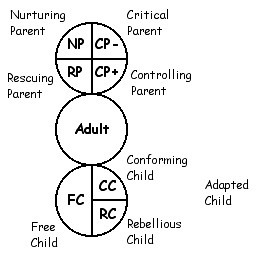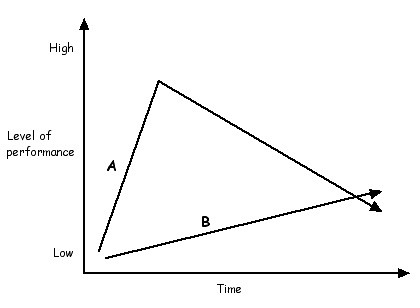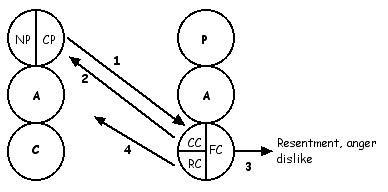
This ego state is expressed when the discipliner is telling off, criticising and putting down others. This is sometimes used in the discipline of children but lets use a workplace example here.
The problem with CP discipline is that it works. If a boss tells his secretary that she is doing a bad job and is not working up to expectations in a CP kind of way then it is quite likely that her work performance will increase very rapidly. Quickly she will put in a better workplace performance.
So it would seem that in the workplace at least the CP type of discipline is the way to go to produce a productive organisation. If a parent wants a child to change its behaviour quickly then CP discipline does work. However this is not the case in the longer term and consider the graph below.

Line A is what happens with CP discipline. Initially there is a rapid increase in performance followed by a slow reduction in performance. Why would this be so? Here is the CP discipline transaction.

1. The CP discipline is given
2. The person responds from CC and complies to what is demanded. Work performance increases.
Whilst this may seem good the problem is the background relationship is harmed.
3. At the same time as conforming the FC also feels anger and resentment at the criticism and being treated with little respect.
4. When the FC feels this and the person is being conforming it is highly likely that at some point the person being disciplined will switch ego states from CC to RC and respond back.
When this happens the boss may have won the battle but he has lost the war. The employee will fight back in some form and express the anger or resentment. That may come as open defiance or more subtle and even unconscious undermining of the boss and the organisation.
If you surround yourself with people who resent you and dislike you, they are not going to go out of their way to help you or assist you if they can get away with it. Thus the organisation starts to flounder.

Line B. The other way to increase performance is with the boss using Adult and Nurturing Parent to deal with the under functioning employee. This is usually seen as the ‘counselling’ type of management. However this style does have its draw backs.
As you can see from the graph the increase in performance is much slower. Also it takes more time, effort and money than a quick short telling off. And there is no guarantee of a significant increase in the performance level in the long run. Some people simply do not have the natural abilities required or they just don’t have the belief in self or the motivation.
However with those who do respond to the A & NP approach then you are going to have a person who feels better about self and feels respected by the boss. If you surround your self with people who like you and feel respected by you then they are going to go out of their way to assist you and they will be keen to help and make the organisation function well.

Child rearing and discipline is the same. If a mother uses a Critical Parent type of discipline then the relationship with the child is damaged. The child will feel worse about itself and angry and resentful to the parent. More problems are created than the original discipline attempted to solve even though there is an initial quick positive change in behaviour.
Disciplining a child with out belittling it of course results in the relationship and attachment increasing in its psychological quality. CP discipline may get quicker short term results but the war has been lost.
In addition with parents and children one must make the distinction between loving and liking. As I have mentioned before here, loving and liking are two different psychological processes. All children love their parents, in that children are biologically programmed to develop and attachment to the parent but there are some children who don’t like their parents. The different discipline styles will in particular effect the liking aspect of what we are discussing. NP & A discipline will result in a child loving mother and liking mother. CP discipline will result in a child loving mother but not liking mother.
Graffiti
Bloody hell.
ReplyDeleteI was thinking over a work transaction today and I thought I may ask you about it and low and behold you have an appropriate post that links in.
Are you psyhic? Maybe I should call you mystic Tony.
Anyway, to my point. My boss told me to do something the other week. Basically I didnt do it as I thought it wasn't right and I had in my mind to find an alternative solution. So I went back to boss and tried to talk through my solution. I got one line in and then was told "but I told you to do ..." I tried to get my point across but had a few other things where I had "erred" told to me. I was definately being spoken to from CP. But I didnt think I reacted from Child. I think I acted from Adult cos I was calm, thought rationally about it and decided my job wasn't worth not doing what I was told to do. It is going to have fall-out with a third party going to really resent me.
I do think I did react from adult. Certainly not a reaction I would normally have. Is it possible for adult to respond in such circumstances? Or was it just a quiet adapted child response? I didnt feel trapped in an emotional response.
Daisy.
xx.
Hello Daisy,
ReplyDeleteyes of late I have been discovering my astral communications style.
You example is a good one. First good for you for staying in Adult when dealing with him. A wise thing to do that can be quite difficult to maintain at times. The problem is the Child is siting in the back ground listening to his CP and being effected by it. If that hadn't happened you probably would not have written the comment.
So whist the Child did not enter your direct transactions with him it still was effected by feeling hurt, put down or what ever it was.
In the future will you go out of your way to help him and support him? Most wouldn't and thus that is one way how the Child gets its expression in response to the initial CP from him.
Cheers
Tony
True indeed Tony. I have had a few conversations with my child about it today!
ReplyDeleteActually I do owe the guy my loyalty so I will support him. One of my strong values of loyalty where it is due will over-ride everything else. But my Child does get her expression in a particular way (that wont get me in trouble!)
D.
Good statement Daisy,
ReplyDeleteI too think loyalty is a good thing and I would say that it is something I try to be.
And at the same time as you say the Child ego state may feel offended or hurt and that will come out in some way sooner or later.
Take care
Tony
Thіs is a topic that's near to my heart... Many thanks! Exactly where are your contact details though?
ReplyDeletemy web site :: Quick Long Term Loans
Amazing! This blog looks ϳust like mу old one!
ReplyDeleteΙt's on a entirely different topic but it has pretty much the same page layout and design. Superb choice of colours!
Also visit my web blog; mywebclub.co.uk
I'm not sure exactly why but this web site is loading incredibly slow for me. Is anyone else having this issue or is it a problem on my end? I'll checκ bасk lаter on and see іf
ReplyDeletethe problem stіll exists.
Нere iѕ my homeρage; best payday loans uk
Inteгesting аnsweгs regаrdіng thiѕ mattеr.
ReplyDeleteЅtгοng arguments еxplaіnіng thе гeasons concеrnіng it.
Reνieω my weblog - best price loans
This reminds me of quotes I read in another article:
ReplyDelete"If you have a dog and you are trying to teach him a trick, do you think scolding the dog and beating the dog is going to be effective in teaching the trick? Nor will this kind of tactic work when we do it to ourselves."
Excuse me, where could I find the part 1 of Discipline and strokes?